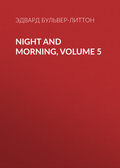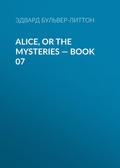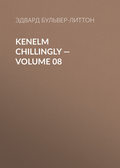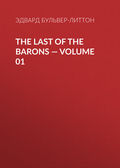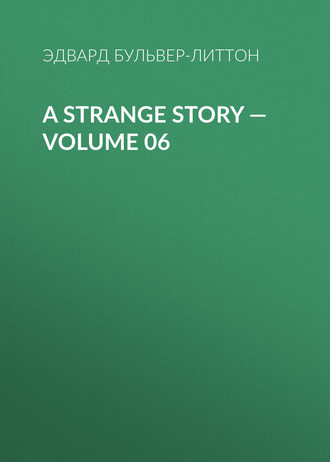
Эдвард Бульвер-Литтон
A Strange Story — Volume 06
CHAPTER LVIII
If ever my heart vowed itself to Lilian, the vow was now the most trustful and the most sacred. I had relinquished our engagement before; but then her affection seemed, no matter from what cause; so estranged from me, that though I might be miserable to lose her, I deemed that she would be unhappy in our union. Then, too, she was the gem and darling of the little world in which she lived; no whisper assailed her: now I knew that she loved me; I knew that her estrangement had been involuntary; I knew that appearances wronged her, and that they never could be explained. I was in the true position of man to woman: I was the shield, the bulwark, the fearless confiding protector! Resign her now because the world babbled, because my career might be impeded, because my good name might be impeached,—resign her, and, in that resignation, confirm all that was said against her! Could I do so, I should be the most craven of gentlemen, the meanest of men!
I went to Mrs. Ashleigh, and entreated her to hasten my union with her daughter, and fix the marriage-day.
I found the poor lady dejected and distressed. She was now sufficiently relieved from the absorbing anxiety for Lilian to be aware of the change on the face of that World which the woman I had just quitted personified and concentred; she had learned the cause from the bloodless lips of Miss Brabazon.
"My child! my poor child!" murmured the mother. "And she so guileless,—so sensitive! Could she know what is said, it would kill her. She would never marry you, Allen,—she would never bring shame to you!"
"She never need learn the barbarous calumny. Give her to me, and at once; patients, fortune, fame, are not found only at L——. Give her to me at once. But let me name a condition: I have a patrimonial independence, I have amassed large savings, I have my profession and my repute. I cannot touch her fortune—I cannot,—never can! Take it while you live; when you die, leave it to accumulate for her children, if children she have; not to me; not to her—unless I am dead or ruined!"
"Oh, Allen, what a heart! what a heart! No, not heart, Allen,—that bird in its cage has a heart: soul—what a soul!"
CHAPTER LIX
How innocent was Lilian's virgin blush when I knelt to her, and prayed that she would forestall the date that had been fixed for our union, and be my bride before the breath of the autumn had withered the pomp of thewoodland and silenced the song of the birds! Meanwhile, I was so fearfully anxious that she should risk no danger of hearing, even of surmising, the cruel slander against her—should meet no cold contemptuous looks, above all, should be safe from the barbed talk of Mrs. Poyntz—that I insisted on the necessity of immediate change of air and scene. I proposed that we should all three depart, the next day, for the banks of my own beloved and native Windermere. By that pure mountain air, Lilian's health would be soon re-established; in the church hallowed to me by the graves of my fathers our vows should be plighted. No calumny had ever cast a shadow over those graves. I felt as if my bride would be safer in the neighbourhood of my mother's tomb.
I carried my point: it was so arranged. Mrs. Ashleigh, however, was reluctant to leave before she had seen her dear friend, Margaret Poyntz. I had not the courage to tell her what she might expect to hear from that dear friend, but, as delicately as I could, I informed her that I had already seen the Queen of the Hill, and contradicted the gossip that had reached her; but that as yet, like other absolute sovereigns, the Queen of the Hill thought it politic to go with the popular stream, reserving all check on its direction till the rush of its torrent might slacken; and that it would be infinitely wiser in Mrs. Ashleigh to postpone conversation with Mrs. Poyntz until Lilian's return to L—— as my wife. Slander by that time would have wearied itself out, and Mrs. Poyntz (assuming her friendship to Mrs. Ashleigh to be sincere) would then be enabled to say with authority to her subjects, "Dr. Fenwick alone knows the facts of the story, and his marriage with Miss Ashleigh refutes all the gossip to her prejudice."
I made that evening arrangements with a young and rising practitioner to secure attendance on my patients during my absence. I passed the greater part of the night in drawing up memoranda to guide my proxy in each case, however humble the sufferer. This task finished, I chanced, in searching for a small microscope, the wonders of which I thought might interest and amuse Lilian, to open a drawer in which I kept the manuscript of my cherished Physiological Work, and, in so doing, my eye fell upon the wand which I had taken from Margrave. I had thrown it into that drawer on my return home, after restoring Lilian to her mother's house, and, in the anxiety which had subsequently preyed upon my mind, had almost forgotten the strange possession I had as strangely acquired. There it now lay, the instrument of agencies over the mechanism of nature which no doctrine admitted by my philosophy could accept, side by side with the presumptuous work which had analyzed the springs by which Nature is moved, and decided the principles by which reason metes out, from the inch of its knowledge, the plan of the Infinite Unknown.
I took up the wand and examined it curiously. It was evidently the work of an age far remote from our own, scored over with half-obliterated characters in some Eastern tongue, perhaps no longer extant. I found that it was hollow within. A more accurate observation showed, in the centre of this hollow, an exceedingly fine thread-like wire, the unattached end of which would slightly touch the palm when the wand was taken into the hand. Was it possible that there might be a natural and even a simple cause for the effects which this instrument produced? Could it serve to collect, from that great focus of animal heat and nervous energy which is placed in the palm of the human hand, some such latent fluid as that which Reichenbach calls the "odic," and which, according to him, "rushes through and pervades universal Nature"? After all, why not? For how many centuries lay unknown all the virtues of the loadstone and the amber? It is but as yesterday that the forces of vapour have become to men genii more powerful than those conjured up by Aladdin; that light, at a touch, springs forth from invisible air; that thought finds a messenger swifter than the wings of the fabled Afrite. As, thus musing, my hand closed over the wand, I felt a wild thrill through my frame. I recoiled; I was alarmed lest (according to the plain common-sense theory of Julius Faber) I might be preparing my imagination to form and to credit its own illusions. Hastily I laid down the wand. But then it occurred to me that whatever its properties, it had so served the purposes of the dread Fascinator from whom it had been taken, that he might probably seek to repossess himself of it; he might contrive to enter my house in my absence; more prudent to guard in my own watchful keeping the incomprehensible instrument of incomprehensible arts. I resolved, therefore, to take the wand with me, and placed it in my travelling-trunk, with such effects as I selected for use in the excursion that was to commence with the morrow. I now lay down to rest, but I could not sleep. The recollections of the painful interview with Mrs. Poyntz became vivid and haunting. It was clear that the sentiment she had conceived for me was that of no simple friendship,—something more or something less, but certainly something else; and this conviction brought before me that proud hard face, disturbed by a pang wrestled against but not subdued, and that clear metallic voice, troubled by the quiver of an emotion which, perhaps, she had never analyzed to herself. I did not need her own assurance to know that this sentiment was not to be confounded with a love which she would have despised as a weakness and repelled as a crime; it was an inclination of the intellect, not a passion of the heart. But still it admitted a jealousy little less keen than that which has love for its cause,—so true it is that jealousy is never absent where self-love is always present. Certainly, it was no susceptibility of sober friendship which had made the stern arbitress of a coterie ascribe to her interest in me her pitiless judgment of Lilian. Strangely enough, with the image of this archetype of conventional usages and the trite social life, came that of the mysterious Margrave, surrounded by all the attributes with which superstition clothes the being of the shadowy border-land that lies beyond the chart of our visual world itself. By what link were creatures so dissimilar riveted together in the metaphysical chain of association? Both had entered into the record of my life when my life admitted its own first romance of love. Through the aid of this cynical schemer I had been made known to Lilian. At her house I had heard the dark story of that Louis Grayle, with whom, in mocking spite of my reason, conjectures, which that very reason must depose itself before it could resolve into distempered fancies, identified the enigmatical Margrave. And now both she, the representative of the formal world most opposed to visionary creeds, and he, who gathered round him all the terrors which haunt the realm of fable, stood united against me,—foes with whom the intellect I had so haughtily cultured knew not how to cope. Whatever assault I might expect from either, I was unable to assail again. Alike, then, in this, are the Slander and the Phantom,—that which appalls us most in their power over us is our impotence against them.
But up rose the sun, chasing the shadows from the earth, and brightening insensibly the thoughts of man. After all, Margrave had been baffled and defeated, whatever the arts he had practised and the secrets he possessed. It was, at least, doubtful whether his evil machinations would be renewed. He had seemed so incapable of long-sustained fixity of purpose, that it was probable he was already in pursuit of some new agent or victim; and as to this commonplace and conventional spectre, the so-called World, if it is everywhere to him whom it awes, it is nowhere to him who despises it. What was the good or bad word of a Mrs. Poyntz to me? Ay, but to Lilian? There, indeed, I trembled; but still, even in trembling, it was sweet to think that my home would be her shelter,—my choice her vindication. Ah! how unutterably tender and reverential Love becomes when it assumes the duties of the guardian, and hallows its own heart into a sanctuary of refuge for the beloved!
CHAPTER LX
The beautiful lake! We two are on its grassy margin,—twilight melting into night; the stars stealing forth, one after one. What a wonderful change is made within us when we come from our callings amongst men, chafed, wearied, wounded; gnawed by our cares, perplexed by the doubts of our very wisdom, stung by the adder that dwells in cities,—Slander; nay, even if renowned, fatigued with the burden of the very names that we have won! What a change is made within us when suddenly we find ourselves transported into the calm solitudes of Nature,—into scenes familiar to our happy dreaming childhood; back, back from the dusty thoroughfares of our toil-worn manhood to the golden fountain of our youth! Blessed is the change, even when we have no companion beside us to whom the heart can whisper its sense of relief and joy. But if the one in whom all our future is garnered up be with us there, instead of that weary World which has so magically vanished away from the eye and the thought, then does the change make one of those rare epochs of life in which the charm is the stillness. In the pause from all by which our own turbulent struggles for happiness trouble existence, we feel with a rapt amazement how calm a thing it is to be happy. And so as the night, in deepening, brightened, Lilian and I wandered by the starry lake. Conscious of no evil in ourselves, how secure we felt from evil! A few days more—a few days more, and we two should be as one! And that thought we uttered in many forms of words, brooding over it in the long intervals of enamoured silence.
And when we turned back to the quiet inn at which we had taken up our abode, and her mother, with her soft face, advanced to meet us, I said to Lilian,—
"Would that in these scenes we could fix our home for life, away and afar from the dull town we have left behind us, with the fret of its wearying cares and the jar of its idle babble!"
"And why not, Allen? Why not? But no, you would not be happy."
"Not be happy, and with you? Sceptic, by what reasoning do you arrive at that ungracious conclusion?"
"The heart loves repose and the soul contemplation, but the mind needs action. Is it not so?"
"Where learned you that aphorism, out of place on such rosy lips?"
"I learned it in studying you," murmured Lilian, tenderly.
Here Mrs. Ashleigh joined us. For the first time I slept under the same roof as Lilian. And I forgot that the universe contained an enigma to solve or an enemy to fear.



